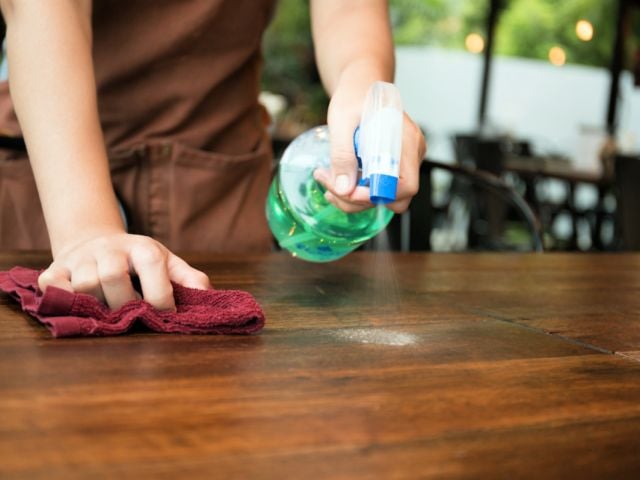
During the cold winter months you may spend more time inside than out. And you may do more cleaning, especially because it’s also the flu and Covid season.
But before you reach for that spray cleaner, you should know that ingredients in many household cleaning products don’t just kill germs, they may also harm your health.
And a new bill in Congress may mean that simply checking product labels and company websites soon won’t be enough to avoid toxic ingredients.
Disinfectant sprays
Disinfectant sprays are appealing types of cleaners, because they can be used on a variety of surfaces and promise to kill germs, including bacteria and viruses.
But many of these spray disinfectants – including name-brand products like Lysol – contain chemicals that can jeopardize your health.
Ingredients of concern
MIPA-borate
MIPA-borate has been linked to hormone disruption. MIPA-borate can be found in many Lysol brand disinfectant sprays, including LYSOL Disinfectant Max Cover Mist, Brighter Horizon, LYSOL Disinfectant Max Cover Mist, Fresh Beginnings, LYSOL Disinfectant Max Cover Mist, White Sales & Ocean Breeze, LYSOL Disinfectant Spray Lightly Scented, Adirondack Cool Air Scent and LYSOL Disinfectant Spray Lightly Scented, Crystal Waters Scent.
Ethanolamine
Ethanolamine is a buffering agent added to cleaning products. It has been linked to a variety of health harms, including asthma, respiratory issues, developmental and reproductive toxicity, and skin allergies and irritation. Contact with this ingredient has been known to cause severe skin burns and eye damage. It can also be found in many Lysol disinfectant spray cleaners.
Ammonium hydroxide
Ammonium hydroxide is a caustic inorganic base, also used in many Lysol disinfectant products. It has been linked to asthma and respiratory issues, severe skin allergies and irritation, and has been shown to be very toxic to aquatic life.
Children’s health concerns
The harmful ingredients in products like Lysol disinfectant sprays are especially concerning for children. Asthma and many childhood cancers are on the rise, and the products we use daily in our homes may be a contributing factor.
Even when using cleaning products as directed, they can release hundreds of chemicals into the air.
Pending legislation
In October 2023, a bill was introduced in Congress on behalf of leading household cleaning product manufacturers – including Reckitt, the manufacturer of Lysol – that would deny Americans the right to know what the toxic chemicals are in their cleaning products.
The industry bill was introduced by Rep. Larry Buschon (R-Ind.). Dubbed the Deny Americans the Right to Know Act – or DARK Act – by consumer advocates, if passed, the law would create an endless regulatory process that would produce a far weaker chemical disclosure system.
It would preempt a state law approved by California legislators in 2017 that requires the disclosure of toxic chemicals in popular household cleaning products like Lysol, Pledge and Windex.
This state law has been in effect since 2020. EWG sponsored the legislation and backed efforts to make it law.
EWG was joined in this effort by other environmental groups and leading household cleaning companies. We worked together to pass the state law, which requires the disclosure of certain toxic chemicals on the package of products, or through a website.
When the state law was passed, household cleaning product manufacturers, including S.C. Johnson, Clorox, Henkel, Procter & Gamble and Reckitt, agreed that they would not seek preemption of Californian’s new law and NGOs agreed not to seek a stronger law in other states.
So far, only Clorox and Henkel have opposed the new bill and pledged to honor their agreement with organizations like EWG.
While MIPA-borate, ethanolamine and ammonium hydroxide are ingredients used in many other cleaners, not just Lysol, Reckitt is one of the only companies trying to keep consumers in the dark about the chemicals in their products.
And an EWG analysis of chemicals that must be disclosed, under California’s Cleaning Product Right to Know Act, found that Reckitt has more chemicals to disclose in their cleaning products than any other company.
Protecting yourself
Consumers looking to reduce exposure to products containing harmful ingredients like mipa-borate, ammonium hydroxide and ethanolamine can use resources like EWG’s Guide to Healthy Cleaning to find top-rated products. When you’re on the go, use the Healthy Living app.
Look for the EWG VERIFIED® mark on cleaners, which shows the product meets EWG’s strictest standards for transparency and health, and is made without chemicals of concern.



